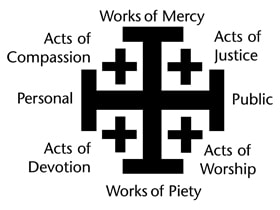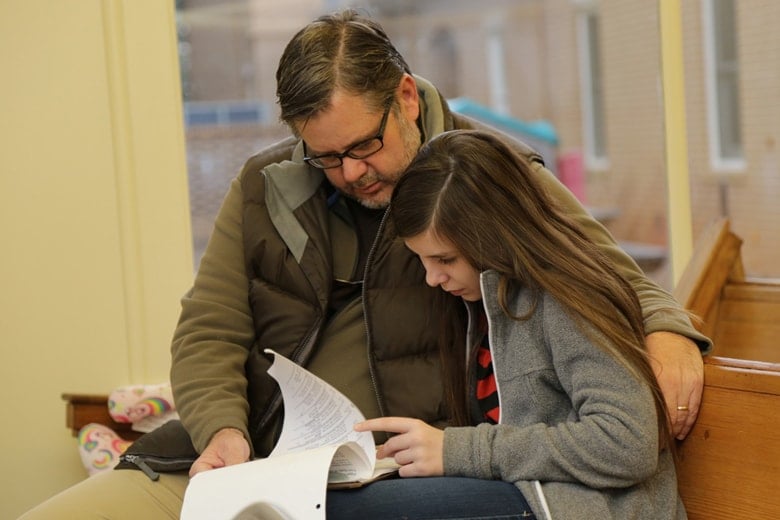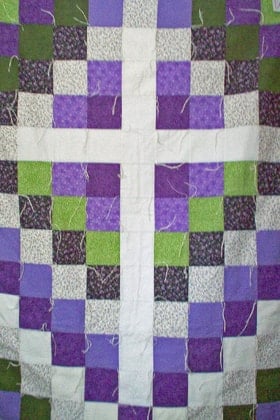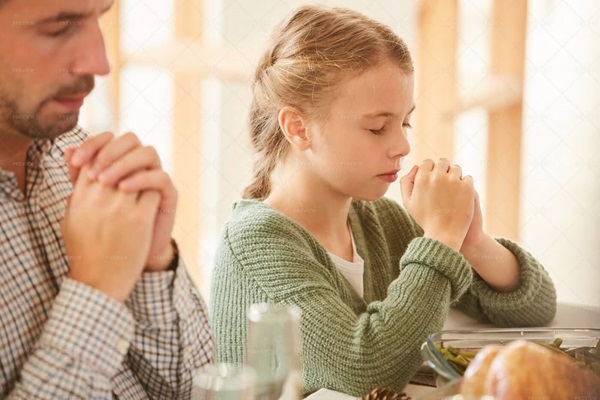When tragedy occurs, we offer our thoughts and prayers for the victims. When a friend is suffering through a difficult time, we promise to pray for them. When we have a big decision to make, we ask others to pray for us.

Some will say that instead of praying for victims, we should do what we can to prevent a repeat of the tragedy. When we tell someone about a struggle and they say they will pray for us, a small part of us may wonder if there isn't something more concrete they could offer. When we ask others to pray for guidance, they may instead be quick to offer advice to help with our decision.
So which is it? Should we pray or do something?
For John Wesley, the founder of the Methodist movement, this was not an either/or question. In A Plain Account of Christian Perfection Wesley writes:
Whether we think of or speak to God, whether we act or suffer for him, all is prayer, when we have no other object than his love, and the desire of pleasing him.
All that a Christian does, even in eating and sleeping, is prayer, when it is done in simplicity, according to the order of God, without either adding to or diminishing from it by his own choice (A Plain Account of Christian Perfection, Q 38, 5).
Wesley taught that the complete Christian has a well-rounded spiritual life, sometimes tending to his or her own soul and other times serving others. He called these "acts of piety" and "acts of mercy."
Acts of piety include things like reading the Bible, going to church, and receiving communion. Acts of mercy are things like offering comfort to others, visiting the sick and in prison, and working to change systems that hurt and victimize people.
For Wesley, acts of both piety and mercy are part of a life of prayer. "In souls filled with love," Wesley continues, "the desire to please God is a continual prayer."

Praying for one another
One of the ways we show love for others is by lifting them before God in prayer. Nancy Miles of Madison (Georgia) First United Methodist Church knows the power of these intercessory prayers.
"I had cancer in 1996 and I started receiving prayer cards from Peachtree Road United Methodist Church in Atlanta. Our daughter-in-law was a member of their intercessory prayer team," Nancy continues. "It blew me away that people I didn't even know were lifting me up."
The cards and prayers also impressed her husband Jack. He told Nancy, "When you get well, we are going to start a prayer ministry here in Madison."
In 2016, the Miles are in their 19th year of leading this ministry that has grown to include 100 members of their congregation volunteering to pray one hour a week. After praying, the congregants send handwritten notes, much like the ones Nancy received years before.
"The importance of those cards," Jack says, "can't be overstated. Some recipients have taped all the cards they've received and they become a headboard over their hospital bed," he reports. Another told Nancy, "I can't get rid of the cards you wrote for my mom."

Covered in prayer
At Englewood (Florida) United Methodist Church, Jane Parker leads a group called, "Prayers & Squares, the Prayer Quilt Ministry." Parker's group is a chapter of an interfaith ministry started by a United Methodist Congregation in California nearly 25 years ago.
Each month "our servants gather to help with the various tasks involved with creating a prayer quilt," Parker reports. These special quilts feature loose threads called "ties" in the corners of each square.
When complete, Parker displays the quilt with a card describing for whom the congregation will be praying. "Our congregation is invited to offer a loving, silent prayer for the recipient and then tie that prayer to the quilt with a square knot."
Since 2012, "we have made, prayed over, and given this wonderful gift of love to 68 saints," Parker reports. "Each quilt has 96 ties and often there are multiple knots on each tie," she continues. "The number of prayers is countless. God is the only one who knows for sure."
Prayer quilt recipients often take them to treatment or the hospital. It is quite a source of comfort to be literally blanketed in the prayers of your church.
Relationships
It is also a blessing to be part of a team that is praying.
Jack reports that his time with intercessory prayer "drives home the truth of how important it is to communicate with our Father in heaven on a regular basis, because of the wonderful things that does to the relationship that we have with him."
Nancy agrees. "One of the ladies in our original group said, 'It's the best hour of the week for me,'" she remembers.
Jane Parker reports that Prayers & Squares not only wraps folks in the love and prayers of God's people, it also encourages members of the congregation to develop deeper prayer lives.
Focusing people in prayer for others not only deepens our relationship to God; it brings those who are praying together.
"I can best describe it as a connectedness," Parker explains, "a bond with each of our souls and hearts that didn't seem to exist as fully as it does now."
These connections come while uniting in prayer, working on quilts, writing cards, and performing other loving acts. "All is prayer," Wesley wrote, "when we have no other object than [God's] love, and the desire of pleasing him."
Joe Iovino works for UMC.org at United Methodist Communications. Contact him by email.
This story was first published on May 5, 2016.





